Avete intenzione di spostare il vostro sito WordPress su una nuova società di hosting o su un server diverso?
Il rischio maggiore quando si cambia web hosting o si migra un sito web su un nuovo server è la perdita di dati e i tempi di inattività.
In questo tutorial passo dopo passo, vi mostreremo come migrare in modo sicuro il vostro sito WordPress su un nuovo host senza alcun tempo di inattività. Risponderemo anche alle domande più frequenti sul trasferimento di un sito WordPress a un nuovo provider di hosting.
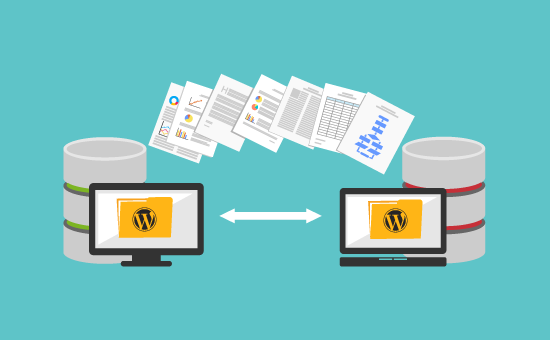
Importante: prima di iniziare, vogliamo farvi sapere che molte società di hosting WordPress offrono un servizio di migrazione gratuito. Potrebbe non essere indicato sul loro sito web, quindi non dovete fare altro che chiedere. Di solito è gratuito, ma alcuni potrebbero richiedere un piccolo contributo.
Detto questo, vediamo i passaggi da seguire per spostare WordPress su un nuovo server di hosting (senza tempi di inattività):
Pronti? Iniziamo.
Passo 1: Scegliere il nuovo host WordPress
Se siete bloccati con un host web lento anche dopo aver ottimizzato la velocità e le prestazioni di WordPress, allora è il momento di spostare il vostro sito WordPress su un nuovo host in grado di gestire il vostro traffico crescente.
Quando si cerca un nuovo provider di hosting WordPress, è importante scegliere con cura per non dover cambiare di nuovo fornitore in tempi brevi.
Ecco chi raccomandiamo:
- Per un hosting condiviso affidabile, consigliamo di scegliere Bluehost. È ufficialmente raccomandato da WordPress.org. Utilizzando il nostro coupon Bluehost, gli utenti di WPBeginner possono usufruire di uno sconto fino al 61% e di un nome di dominio gratuito.
- Per un hosting condiviso più veloce, consigliamo Hostinger. È una delle migliori società di hosting WordPress e offre server più veloci con un’assistenza clienti eccezionale.
- Se siete alla ricerca di hosting cloud o di provider specifici per una determinata località, vi consigliamo di dare un’occhiata a SiteGround. Dispone di centri dati in tre diversi continenti.
- Se state cercando un hosting WordPress gestito, vi consigliamo di dare un’occhiata a WP Engine. È il fornitore migliore e più conosciuto del settore.
Dopo aver acquistato il nuovo hosting, NON installate WordPress. Lo faremo in una fase successiva.
Per il momento, il nuovo account di web hosting dovrebbe essere vuoto, senza file o cartelle nella directory principale.
Fase 2: Impostazione di Duplicator per una facile migrazione
La prima cosa da fare è installare e attivare il plugin Duplicator sul sito web che si desidera spostare. Per maggiori dettagli, consultate la nostra guida passo passo su come installare un plugin di WordPress.
Duplicator è il miglior plugin per la migrazione di WordPress sul mercato. È dotato di backup automatici programmati, supporto per il cloud storage, ripristino in un clic e migrazioni intelligenti.
Nota: Duplicator ha anche una versione gratuita chiamata Duplicator Lite. Può essere utilizzata per spostare il vostro sito web, ma ha funzioni limitate rispetto alla versione pro.
Una volta installato e attivato Duplicator, andate alla pagina Duplicator ” Pacchetti nell’area di amministrazione di WordPress.
Successivamente, è necessario fare clic sul pulsante “Crea nuovo” nell’angolo in alto a destra.
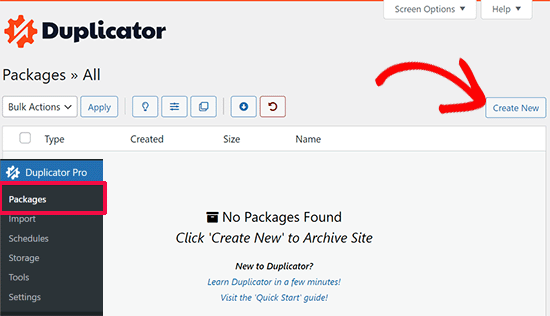
In questo modo si avvia la procedura guidata di backup di Duplicator.
Nella schermata successiva, è possibile fornire un nome opzionale per il backup o semplicemente fare clic sul pulsante “Avanti” per continuare.
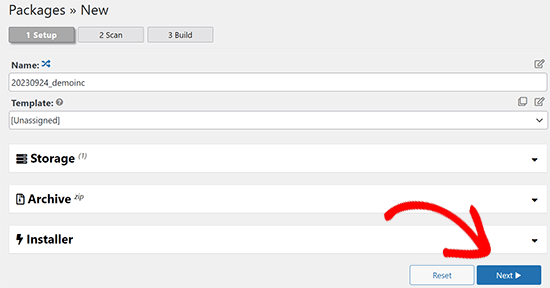
Successivamente, Duplicator scansiona il sistema per assicurarsi che tutto sia in ordine per preparare il pacchetto.
Assicuratevi che i risultati della scansione siano corretti (tutto dovrebbe essere “Buono”) e quindi fate clic sul pulsante “Costruisci”.
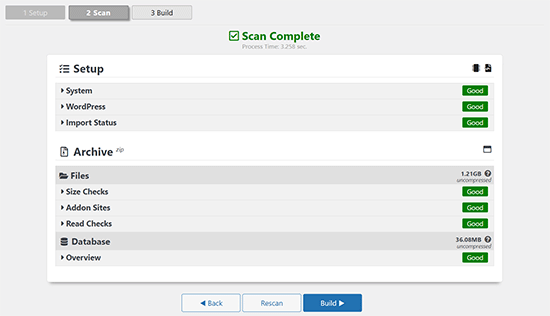
Il processo potrebbe richiedere alcuni minuti, quindi lasciate la scheda aperta mentre il plugin svolge il suo lavoro.
Una volta completato il processo, verranno visualizzate le opzioni di download per il programma di installazione e per l’archivio. È necessario fare clic sul pulsante “Download” e selezionare “Entrambi i file”.
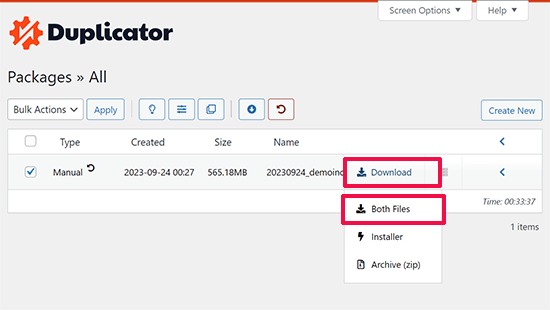
Il file di archivio è una copia del vostro sito web completo, mentre il file di installazione automatizza il processo di installazione.
Passo 3: Importare il sito WordPress nel nuovo host
Dopo aver scaricato i file dell’archivio e del programma di installazione, il passo successivo è caricarli sul nuovo host web.
È possibile farlo collegandosi al nuovo host Web tramite FTP.
Se non l’avete mai fatto prima, date un’occhiata alla nostra guida per principianti sul caricamento di file via FTP su WordPress.
Normalmente, quando si collega il client FTP, si inserisce il nome di dominio del sito web come host.
Tuttavia, poiché il nome di dominio punta ancora al vecchio host, è necessario connettersi inserendo l’indirizzo IP o il nome host del server.
Potete trovare queste informazioni nella dashboard del pannello di controllo del vostro nuovo account di hosting.
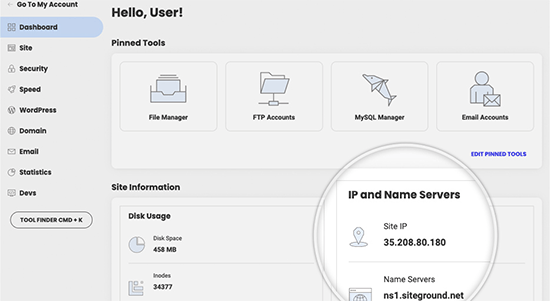
Se non riuscite a trovare queste informazioni, potete chiedere assistenza alla vostra nuova società di web hosting, che vi aiuterà.
Utilizzando il client FTP, è necessario caricare sia il file installer.php sia il file .zip dell’archivio nella directory principale del sito web.
Di solito si tratta della cartella /username/public_html/.
Anche in questo caso, se non siete sicuri, chiedete alla vostra società di web hosting.
Assicuratevi che la vostra directory principale sia completamente vuota. Alcune società di web hosting installano automaticamente WordPress al momento dell’iscrizione.
Se WordPress è installato nella directory principale, è necessario prima eliminare WordPress.
Una volta fatto ciò, è necessario caricare sia il file zip dell’archivio sia il file installer.php nella directory principale del sito.
Passo 4: modificare il file Hosts per prevenire i tempi di inattività
Una volta caricati entrambi i file sul nuovo host, è necessario accedere al file installer.php in un browser.
Normalmente, si può accedere a questo file utilizzando un URL come questo:
http://www.example.com/installer.php
Tuttavia, questo URL vi porterà al vostro vecchio host web e riceverete un errore 404. Questo perché il nome di dominio punta ancora al vecchio host web.
Normalmente, altri tutorial potrebbero dirvi di cambiare il nameserver del vostro dominio e farlo puntare alla nuova società di hosting, ma è sbagliato.
Se lo fate ora, i vostri visitatori vedranno un sito web non funzionante durante la migrazione.
Vi mostreremo come potete accedere temporaneamente al vostro nuovo sito sul vostro computer senza influenzare il vostro vecchio sito.
Questo viene fatto con il file hosts del computer.
Il file hosts può essere utilizzato per mappare i nomi di dominio a indirizzi IP specifici. In altre parole, consente di ingannare il computer facendogli credere che il sito web sia spostato anche se non lo è.
Vediamo come aggiungere una voce per il vostro nome di dominio nel file hosts in modo che punti alla vostra nuova società di hosting.
Queste modifiche vi permetteranno di accedere ai file sul nuovo host utilizzando il vostro nome di dominio, mentre il resto del mondo continuerà ad accedere al vostro sito dal vecchio host. Questo garantisce il 100% di uptime.
La prima cosa da fare è trovare l’indirizzo IP del vostro nuovo server di web hosting.
Per trovarlo, è necessario accedere alla dashboard di cPanel e fare clic sul link Espandi statistiche nella barra laterale di sinistra. L’indirizzo del vostro server sarà elencato come “Indirizzo IP condiviso”.
Ad esempio, su Hostinger, troverete l’indirizzo IP del vostro server sotto i dettagli del vostro piano di hosting.
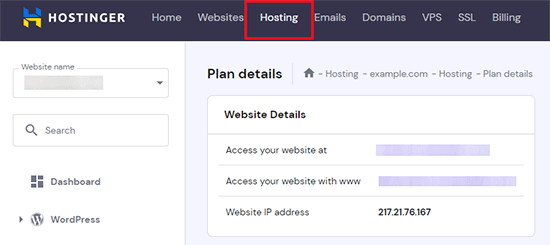
Se si utilizza un PC Windows, è necessario aprire l’applicazione Blocco note con i privilegi di amministratore.
È sufficiente fare clic sul pulsante “Start” e cercare l’applicazione Notepad. Fare clic con il tasto destro del mouse sull’icona del Blocco note e selezionare “Esegui come amministratore”.
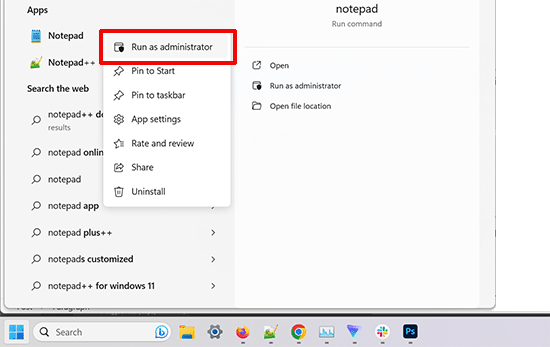
Verrà visualizzato un prompt UAC di Windows e sarà necessario fare clic su “Sì” per avviare Notepad con i privilegi di amministratore.
Nella schermata del Blocco note, andare su File ” Apri e spostarsi nella cartella C:\Windows\System32\drivers\etc. Da questa cartella, selezionare il file hosts e aprirlo.
Se si utilizza un Mac, è necessario aprire l’applicazione Terminale e inserire questo comando per modificare il file hosts:
sudo nano /private/etc/hosts
Sia per gli utenti Windows che per quelli Mac, nella parte inferiore del file hosts è necessario inserire l’indirizzo IP copiato e poi il nome del dominio. In questo modo:
192.168.1.22 www.example.com
Assicuratevi di sostituire l’indirizzo IP con quello copiato da cPanel e example.com con il vostro nome di dominio.
Al termine, salvare le modifiche.
Ora è possibile accedere ai propri file sul nuovo host utilizzando il nome di dominio sul proprio computer.
Importante: Non dimenticate di annullare le modifiche apportate al file hosts al termine della migrazione (passaggio 6).
Passo 5: Creare il database MySQL sul nuovo host
Prima di eseguire il programma di installazione sul nuovo host, è necessario creare un database MySQL sul nuovo account di hosting. Se avete già creato un database MySQL, potete passare alla fase successiva.
Creare un database in cPanel
Accedete al cruscotto del vostro nuovo account di hosting, scorrete fino alla sezione Database e fate clic sull’icona “Database MySQL”.
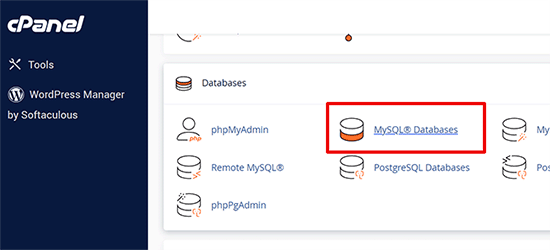
Verrà visualizzato un campo per la creazione di un nuovo database.
Inserite un nome per il vostro database e fate clic sul pulsante “Crea database”.
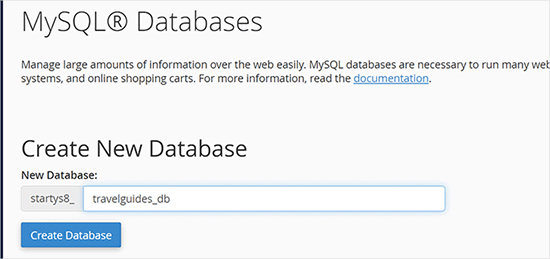
Dopo aver creato il database MySQL, è necessario scorrere verso il basso fino alla sezione Utenti MySQL.
Quindi, fornire un nome utente e una password per il nuovo utente e fare clic sul pulsante “Crea utente”.
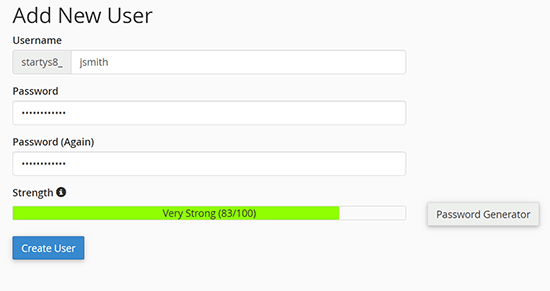
Successivamente, è necessario aggiungere questo utente al database. Questo darà al nome utente appena creato tutti i permessi per lavorare su quel database.
È possibile farlo scorrendo verso il basso fino alla sezione “Aggiungi utente a un database”. È sufficiente selezionare l’utente del database creato dal menu a discesa accanto all’utente, quindi selezionare il database e fare clic sul pulsante “Aggiungi”.
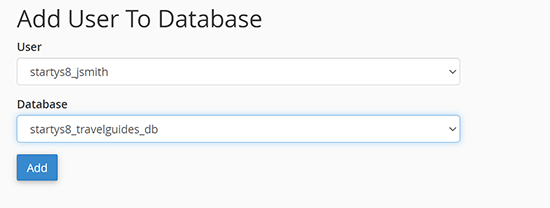
Il database è ora pronto per essere utilizzato con WordPress. Assicuratevi di annotare il nome del database, il nome utente e la password. Queste informazioni vi serviranno nella fase successiva.
Fase 6: avvio del processo di migrazione del Duplicatore
Ora siamo pronti a eseguire il programma di installazione. Navigate al seguente indirizzo nella finestra del browser, sostituendo example.com con il nome del vostro dominio:
http://www.example.com/installer.php
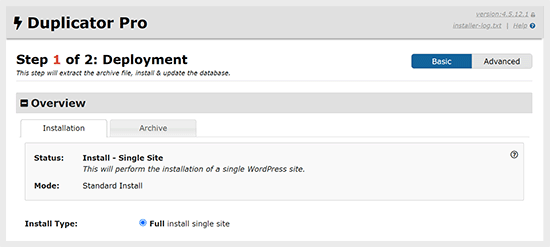
Il programma di installazione eseguirà alcuni test e mostrerà “Pass” accanto ai test di archivio e di convalida.
È necessario selezionare la casella di controllo dei termini e delle condizioni e continuare facendo clic sul pulsante “Avanti”.
A questo punto, vi verrà chiesto di inserire l’host MySQL, il nome del database, il nome utente e la password.
L’host sarà probabilmente localhost. Dopodiché, si inseriranno i dettagli del database creato nel passaggio precedente.
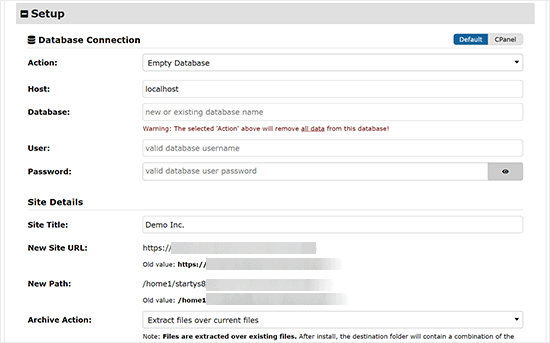
Successivamente, il Duplicatore deve verificare di potersi connettere al database e di poter eseguire l’installazione.
Fare clic sul pulsante “Convalida” in basso per continuare.

Se Duplicator riesce a connettersi, i risultati del test vengono visualizzati come Pass.
A questo punto è possibile selezionare la casella di controllo dei termini e delle avvertenze e fare clic sul pulsante “Avanti”.
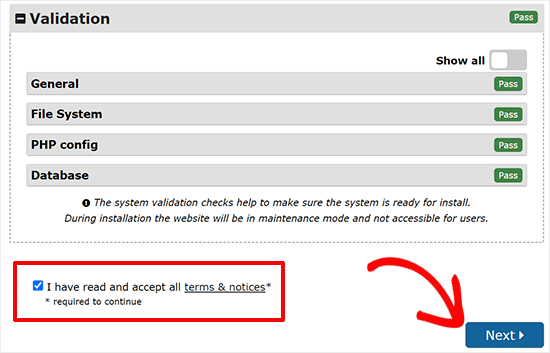
Fare clic sul pulsante “Avanti” per continuare.
Duplicator importerà ora il database di WordPress dallo zip dell’archivio nel nuovo database.
Successivamente, verrà richiesto di aggiornare l’URL o il percorso del sito. Poiché non si cambiano i nomi di dominio, NON è necessario modificare nulla in questo punto.
È sufficiente fare clic sul pulsante “Avanti” per continuare.
Duplicator eseguirà i passaggi finali e mostrerà il pulsante di accesso.
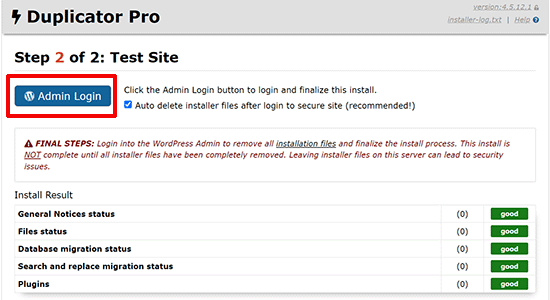
Ora potete accedere al vostro sito WordPress sul nuovo host per verificare che tutto funzioni come previsto.
Passo 7: aggiornare i server dei nomi di dominio (DNS)
A questo punto, avete creato una copia completa del database e dei file di WordPress sul nuovo server di hosting, ma il vostro dominio punta ancora al vecchio account di web hosting.
Per aggiornare il dominio, è necessario cambiare i server dei nomi DNS. In questo modo si garantisce che gli utenti vengano indirizzati alla nuova posizione del sito web quando digitano il dominio nel loro browser.
Se avete registrato il dominio con il vostro provider di hosting, è meglio trasferire il dominio a un nuovo host.
D’altra parte, se si utilizza una società di registrazione di domini come Domain.com, GoDaddy o Network Solutions, è necessario aggiornare i server dei nomi.
Sono necessarie le informazioni sul server dei nomi DNS del nuovo host Web. Di solito si tratta di un paio di URL che assomigliano a questo:
ns1.hostname.comns2.hostname.com
In questa guida vi mostreremo come cambiare i server DNS con GoDaddy.
Per altri provider di hosting, date un’occhiata alla nostra guida sulla modifica dei nameserver dei domini.
A seconda della società di registrazione del dominio o dell’host Web, le schermate possono apparire diverse. Tuttavia, il concetto di base è lo stesso.
Dovete cercare l’area di gestione del dominio e poi cercare i server dei nomi. Se avete bisogno di assistenza per aggiornare i server dei nomi, potete chiedere alla vostra società di web hosting.
Per GoDaddy, è necessario accedere al proprio account GoDaddy e fare clic su “Domini”.
Successivamente, è necessario fare clic sul pulsante “Gestisci” accanto al nome di dominio che si desidera modificare.

Andare alla sezione “Impostazioni aggiuntive”.
Quindi, dovrete cliccare su “Gestisci DNS” per continuare.
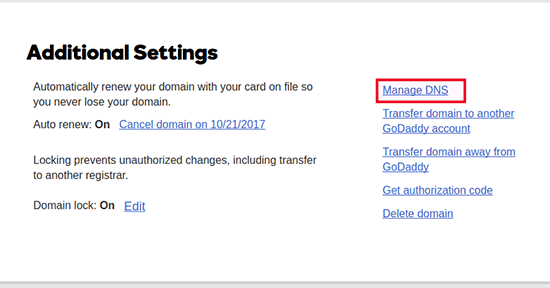
Successivamente, è necessario scorrere verso il basso fino alla sezione “Nameservers”.
Qui, fare clic sul pulsante “Modifica”.
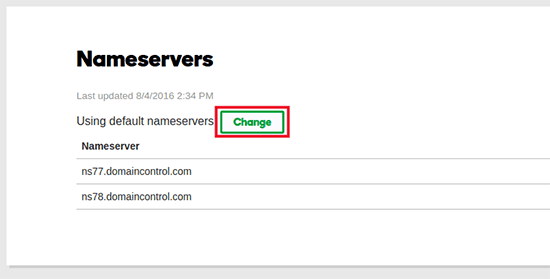
Innanzitutto, è necessario cambiare il menu a tendina del tipo di server dei nomi da “Predefinito” a “Personalizzato”.
Successivamente, è possibile inserire le informazioni del nuovo provider di hosting alla voce Nameservers.
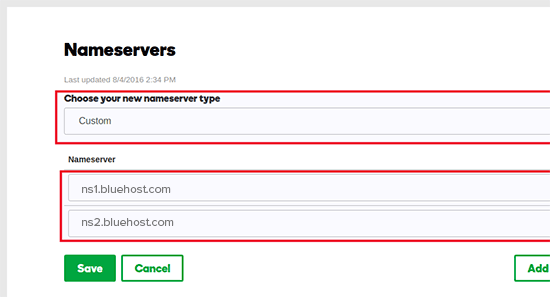
Non dimenticate di fare clic sul pulsante “Salva” per memorizzare le modifiche.
La modifica dei nameserver del vostro dominio è stata effettuata con successo. Le modifiche DNS possono richiedere dalle 4 alle 48 ore per essere propagate a tutti gli utenti.
Poiché i contenuti sono gli stessi sul vecchio e sul nuovo host, i vostri utenti non noteranno alcuna differenza. La migrazione di WordPress avverrà senza soluzione di continuità e senza tempi di inattività.
Per sicurezza, vi consigliamo di aspettare a cancellare il vecchio account di hosting fino a 7 giorni dopo la migrazione.
Domande frequenti
Ecco alcune domande che molti dei nostri utenti ci pongono durante il trasferimento di WordPress da un host all’altro.
1. Come faccio a migrare il mio sito web WordPress su un altro host?
Potete migrare il vostro sito web WordPress spostando i file e il database di WordPress dal vecchio host al nuovo provider di hosting.
Alcune società di hosting offrono anche servizi gratuiti di trasferimento di siti web, ma è necessario chiedere a loro. In alternativa, potete farlo voi stessi trasferendo i file con un client FTP e importando il database tramite phpMyAdmin.
2. Posso migrare il mio sito WordPress su un altro provider di hosting?
Sì, siete liberi di migrare il vostro sito WordPress su un altro provider di hosting.
3. Posso iscrivermi al nuovo account di hosting senza registrare un nome di dominio?
Sì, è assolutamente possibile sottoscrivere un account di hosting senza registrare un nome di dominio.
Il nome di dominio e l’hosting sono due servizi diversi e non è necessariamente necessario registrare un nome di dominio quando ci si iscrive a un nuovo host. Per maggiori dettagli, consultate la nostra guida sulla differenza tra nome di dominio e hosting web.
Alcuni provider di hosting vi chiederanno di selezionare un nome di dominio come primo passo per l’acquisto dell’hosting. Inoltre, vi permetteranno di inserire un nome di dominio se ne avete già uno.
4. Devo trasferire il mio nome di dominio al nuovo host?
No, non è necessario trasferire il nome di dominio al nuovo host. Tuttavia, trasferendo il nome di dominio sul nuovo hosting sarà più facile rinnovarlo e gestirlo sotto la stessa dashboard del nuovo account di hosting.
Per saperne di più su questo argomento, consultate la nostra guida definitiva sui nomi di dominio e sul loro funzionamento.
5. Come si risolve l’errore di connessione al database in Duplicator?
Se viene visualizzato un errore di connessione al database o un errore di connessione al database in Duplicator, è probabile che siano state inserite informazioni errate per la connessione al database.
Assicuratevi che il nome del database, il nome utente MySQL e la password siano corretti. Alcune società di web hosting non utilizzano localhost come host per i loro server MySQL. In questo caso, dovrete chiedere al personale di supporto del vostro host web di fornirvi le informazioni corrette.
6. Come posso verificare se il mio sito web viene caricato dal nuovo host?
Esistono diversi strumenti online che consentono di vedere chi ospita un sito web. Dopo aver trasferito il vostro sito web sul nuovo host, potete utilizzare uno di questi strumenti che vi mostreranno il nome della società di hosting web che ospita il vostro sito.
Se non è passato molto tempo da quando avete migrato il vostro sito web e avete apportato modifiche al server dei nomi di dominio (DNS), è probabile che il vostro sito sia ancora caricato dal vecchio host. Le modifiche al nome di dominio possono richiedere fino a 48 ore per propagarsi completamente.
7. È necessario eliminare i file o i dati dal vecchio host?
Quando si cambia società di hosting, si consiglia di conservare il vecchio sito web per almeno una settimana. Dopodiché, è possibile eliminare i file dal vecchio host web. Se state cancellando il vostro account, il vostro provider di web hosting cancellerà tutti i vostri dati in base alla sua politica.
8. Per quanto tempo devo mantenere attivo il mio account sul vecchio host?
Una volta migrato il vostro sito web sul nuovo host e se non avete altri siti web ospitati presso il vostro vecchio host, potete cancellare il vostro vecchio account di web hosting.
Tuttavia, in alcuni casi, potreste aver già pagato per l’hosting annuale. Dovreste controllare la loro politica di rimborso per vedere se avete diritto a un rimborso in caso di cancellazione.
9. Come faccio a spostare un sito WordPress con SSL/HTTPS?
È necessario installare un certificato SSL sul nuovo provider di hosting. Dopodiché, si possono seguire gli stessi passi indicati sopra. Assicuratevi solo di utilizzare l’HTTPS negli URL, come https://example.com.
10. Bonus: Migrazione gratuita del sito da parte del nuovo host
Se state cercando di cambiare il vostro hosting web, ma i passaggi sopra descritti vi sembrano troppo complicati, potete scegliere i seguenti provider, che migreranno il vostro sito web per voi.
SiteGround, Hostinger e WP Engine offrono la migrazione gratuita del sito web per gli utenti di WPBeginner.
Ci auguriamo che questa guida passo-passo vi abbia aiutato a spostare WordPress sul vostro nuovo host senza alcun tempo di inattività. Se doveste riscontrare qualche problema durante la migrazione di WordPress, consultate la nostra guida sugli errori più comuni di WordPress e su come risolverli.
Se questo articolo vi è piaciuto, iscrivetevi al nostro canale YouTube per le esercitazioni video su WordPress. Potete trovarci anche su Twitter e Facebook.




Syed Balkhi says
Hey WPBeginner readers,
Did you know you can win exciting prizes by commenting on WPBeginner?
Every month, our top blog commenters will win HUGE rewards, including premium WordPress plugin licenses and cash prizes.
You can get more details about the contest from here.
Start sharing your thoughts below to stand a chance to win!
Moinuddin Waheed says
Hands down the best guide for migrating a website from one host to another without any downtime.
I used to think it’s impossible to do without having some lag but no, it’s possible and with easy to follow steps.
Thanks wpbeginner for this detailed guide. I need to do this very often and had no clue that it can be done with no compromise on website downtime.
THANKGOD JONATHAN says
Thank you for the helpful article.
But how about someone who wants to migrate his reseller hosting to a new reseller account and want to move all his clients websites to the new host? Do you have any article for that? I will really apprecite it.
WPBeginner Support says
We do not have a specific article for bulk movement at the moment but if you reach out to the hosting provider they may have a tool to assist.
Admin
Jiří Vaněk says
The best practice that has proven successful for me:
Download data from FTP.
Create a database dump.
Upload both to the new server.
Test functionality using the HOSTS file.
Switch DNS.
An efficient, functional, and quick method for migrating WordPress to another server.
AC says
Hello,
I have built a new website on a subdomain using we’ll call it hosting server A, could I also use this process to move that website to a new hosting server (B) and update the path to the new domain (noted in step 6), if the new domain is already connected to a live wordpress site on an entirely different server (C)?
Or would I be better to move current website from server C to server B exactly as you have outlined above and get that going, then copy the files from updated website on server A to current hosting server B? Hope that makes sense. Just want the most seamless approach!
For a little bit of an explanation… Business has a website that needs updating that is hosted with another company, I have built the “new” website on my own subdomain. Business owns domain, and wants new website to live on new hosting that they control under same account as domain for easier access to everything moving forward.
WPBeginner Support says
Either method can work, if you are already updating the site then you would want to use the first method and move the new site then update the domain to point toward the correct hosting provider to prevent you from having to do extra work on a live site.
Admin
D Lewis says
Another great tutorial, WPBeginner!
Is this the same process used for simply downloading a WordPress.org blog from an old computer onto another one (keeping the same hosting company)?
Thank you,
D Lewis
WPBeginner Support says
If you are keeping the same host you can normally check with your hosting provider to have them change it to the new server. If they do not offer this then changing your hosts file will likely not work but the other steps would be the same.
Admin
lse says
Do you find it better to create a fresh install of WordPress latest and migrate to this my existing WordPress website – import – data only, rather than the old WordPress – I update from 2011 – migrate all files/data/database, and Not create a fresh install…?
WPBeginner Support says
It would depend on how you want the site’s content. If you are looking to do major changes to the site then creating a new site and importing the content would be good. This guide is for reducing downtime and keeping the site the same which is why we recommend importing all of the files and data.
Admin
KubaP says
Cool. Best tutorial. Works like gem in 2023! I’ve done my first smooth migration with the help of this awesome article
WPBeginner Support says
Glad our guide was helpful!
Admin
Darda says
Thank you so much for this tutorial! It works great!
WPBeginner Support says
Glad our guide was helpful!
Admin
Mr. Akhil says
I am in the stage of 2. it doesn’t show all good but “Size check notice” is not showing good result how can i solve it, what if some scanning process is not good ???
WPBeginner Support says
From the sound of the error, the plugin is warning you that you have a large site and it may have trouble depending on your host for exporting your content. It would depend on the specific error if you are seeing other errors for the steps to follow but the plugin’s support should be able to assist.
Admin
Carlos Almazan says
Thank you very much for this tutorial, it´s amazing!
I would like to ask you if possible, what steps of this tutorial should I skip if I just want to duplicate the first website? In other words, i want to leave the first website as it is and just create a new one (a new copy) in an another hosting provider.
Thank you very much in advance!
Regards!
WPBeginner Support says
For that, we would recommend taking a look at our moving to a new domain article below and not doing the 301 redirects or notifying Google.
https://www.wpbeginner.com/wp-tutorials/how-to-properly-move-wordpress-to-a-new-domain-without-losing-seo/
Admin
Emma says
Good day, thank you for this wonderful tutorial. Please how do i migrate to my new host and use the domain on my new host, without using the old host domain
WPBeginner Support says
For moving your site to a new domain, you would want to take a look at our guide on changing your domain below:
https://www.wpbeginner.com/wp-tutorials/how-to-properly-move-wordpress-to-a-new-domain-without-losing-seo/
Admin
Emmanuel says
Good day, thank you for this wonderful tutorial. Please how do i migrate to my new host and use the domain on my new host, without using the old host domain
WPBeginner Support says
For moving your site to a new domain, you would want to take a look at our guide on changing your domain below:
https://www.wpbeginner.com/wp-tutorials/how-to-properly-move-wordpress-to-a-new-domain-without-losing-seo/
Admin
Spear says
Thank you so much for the informative guide!
I’d like to know if possible, how long does it take to migrate wp project to the server?
Currently the files are in the same server and trying to install wp script via Softaculous.
thank you!
WPBeginner Support says
It would depend on how much content you had on your old site for how long it takes to transfer your content.
Admin
Milan says
What will happen with my mailboxes on old host? How to manage this transfer and keep e-mails and related stuff?
WPBeginner Support says
That would depend on your hosting providers, some have the option to export your mailboxes and import them on the new host while others do not have the option. If you check with your hosting providers they would be able to let you know the options you have available.
Admin
Mandy Steinhardt says
You are the MVP. Thanks for this guide, it worked!
WPBeginner Support says
Glad our guide was helpful
Admin
Cristiano says
Hi! Thanks for this great tutorial.
I’ve moved 1 website and it was flawless.
I tried to move a 2nd website. The content folder was really heavy, so i excluded it from the duplicator. I moved these folder manually.
What I’ve noticed is that the new website is not loading any images.
How can I solve this?
Thanks in advanced.
WPBeginner Support says
You would likely want to check your folder permissions following our guide below:
https://www.wpbeginner.com/wp-tutorials/how-to-fix-image-upload-issue-in-wordpress/
Admin
Adam says
Im having issues with the host file.
Changed it to the correct settings but still seeing the old host site,
Alex S says
Awesome, I did it perfectly. Thanks
Gimel says
Good day,
Does this also work for moving from localhost to an online hosting service?
WPBeginner Support says
For moving your site to a hosting provider from your local computer, you would want to follow our guide below:
https://www.wpbeginner.com/wp-tutorials/how-to-move-wordpress-from-local-server-to-live-site/
Admin
Francis Caysip says
Do I need to change nameservers if the “new” web host is also the domain host?
WPBeginner Support says
If your domain already points to the new host then you would not need to change it, if the domain is pointing toward your old host it would need to be changed.
Admin
Bryce says
Thank you for this very well-written tutorial! It helped me move from a hosting service that upped their prices so that I can get the newcomer discount with a new host. Thanks!
WPBeginner Support says
Glad our guide was helpful
Admin
Jon says
Your article states that the new host folder must be empty before continuing on with the migration. How does this work for someone where I am migrating sites to a host that has other sites already on it?
WPBeginner Support says
your hosting provider would normally have a folder for each specific site and you would add your site to the empty folder.
Admin
Andrea Crenshaw says
Real Lifesaving (Sitesaving) article! Thank you soo much!!
WPBeginner Support says
Glad you found our guide helpful
Admin
Rousseau says
Thank you very much for this article! I just used it to switch hosting providers after getting tired of downtime with my old provider. Appreciate the great documentation.
WPBeginner Support says
Glad our guide was helpful
Admin
Jacob says
Hi, I successfully transferred my website using the Duplicator plugin. Everything works, but now the website is running rather slowly. Is this a common side effect? Any suggestions for fixing this?
WPBeginner Support says
It is hard to say why your site may have slowed down, for a starting point we would recommend going through our guide below for speeding up your site first:
https://www.wpbeginner.com/wordpress-performance-speed/
Admin
Binh says
Hello, Thanks for your guide.
1. I managed to the last steps but there are several issues in Database section, e.g. “DATABASE ERROR: database error write” -> is it common to get this error?
WPBeginner Support says
That sounds like you may have had an issue during the transfer process. You would want to reach out to your hosting provider to ensure they don’t see an error on their end.
Admin
Rasif says
white transferring the site enter the database credentials screen an error showing.
“Error Processing Request an error occurred while testing the data base connection! Please try Again.”
WPBeginner Support says
You would want to ensure your database information is correct for one of the more common causes.
Admin
Thomas says
Bluehost charges to migrate a website. Is that for the service or can I migrate it myself as above and not have to pay the fee??
WPBeginner Support says
The fee would be if you want them to do it for you. If you follow our guide above then it does not have a cost.
Admin
Robert says
I will share my experience: for one case, I had to switch off the plugin responsible for SSL. Than it was possible to migrate the website correctly. Anyway, thank you for this tool! It is awesome!!
WPBeginner Support says
Glad it was helpful and thanks for sharing the workaround you used if someone else runs into that issue
Admin
Ranjit Singh says
Stuck in step 6 after trying to open the installer.php getting privacy error message in chrome
“Your connection is not private
Attackers might be trying to steal your information from site (for example, passwords, messages, or credit cards). Learn more
NET::ERR_CERT_COMMON_NAME_INVALID”
WPBeginner Support says
Reach out to your hosting provider to ensure you have your SSL certificate set up correctly.
Admin
Gordon says
This was a great step to step and helped me migrate a site when another plug-in failed on me. Thanks for your guidance!
WPBeginner Support says
Glad our guide was helpful
Admin
Ryan says
stuck on step 4 I updated the notepad etc host doc but now how do I access the installer.php file? I tried typing in example.com/installer.php with my domain name into browser with no luck. I have saved the duplicator installer.php file into the www folder in the new hosting files.
WPBeginner Support says
You may want to check with your hosting provider to ensure there isn’t an issue with the location of the folder or if the folder was set under a different domain.
Admin
Grace says
Hi! I’m stuck at Step 6/ I really need help. I uploaded the installer and .daf file in the correct root folder but still experiencing the 404 Not Found Error. I don’t know what to do next.
WPBeginner Support says
You would want to reach out to your hosting provider to ensure you’ve placed the file in the correct location.
Admin
Nic says
I get an error on Step 1: Deployment:
Service Unavailable
The server is temporarily unable to service your request due to maintenance downtime or capacity problems. Please try again later.
WPBeginner Support says
You would want to reach out to your hosting provider for assistance. We have an article covering the different reasons for that error that you can take a look at below:
https://www.wpbeginner.com/wp-tutorials/how-to-fix-503-service-unavailable-error-in-wordpress/
Admin
Chris says
Hi, thank you for this guide.
I was thinking you might need to add on the “nameserver” part that when migrating to a new web host is complete it is not necessary to change the but you need to change the A records to point the IP address of your new web host from your domain registration account settings. thank you and more power!
WPBeginner Support says
While that is an option it is not the most beginner-friendly and can cause confusion later for some users which is why we recommend the nameserver change at the moment.
Admin
Jossif G says
Great write up and direction. I had couple from web, but yours is by far the best.
You provided a lot of details that no one does, like prepare cpanel files before installing. It help me a lot, thank you very much
WPBeginner Support says
Glad our guide was helpful
Admin
Jumadi says
This guide is really helpful, you save me a lot buddy.. Thank you so much..
WPBeginner Support says
Glad our guide was helpful
Admin
Vineesh says
Awesome post.
Worked out Well.
thanks guys….
WPBeginner Support says
You’re welcome, glad you found our content helpful
Admin
Sebastian says
Thanks, simple and easy
WPBeginner Support says
You’re welcome
Admin
Peace Ronny says
Can you transfer your project via USB
WPBeginner Support says
You would need physical access to your hosting provider’s service to do that.
Admin
Dileepa K. says
Nice Article and very helpful
WPBeginner Support says
Glad you found our guide helpful
Admin
Jack says
Thanks for this but im still confused, I am using a CDN and the DNS are pointing to the it, should i first pause the CDN or can still do the process ignoring it then i wont have to update the NS? How should i do it right with no downtime?
WPBeginner Support says
You can still follow this guide. When changing where your namservers are pointing you would update where your CDN is pointing rather than your nameservers.
Admin
Abdulkarim says
Thank you, it helps me a lot,
Best regards,
WPBeginner Support says
You’re welcome
Admin
Jeff Cole says
Lovely clear instructions, moved site over easily. My old host site I could access with or without the WWW , after the change over and before changing the nameserver I could access new site in host file with WWW and the old site without WWW. Thanks
WPBeginner Support says
You would want to reach out to your hosting provider to ensure your nameserver change was set up and that you don’t still have your hosts file changed.
Admin
Zaeem Khan says
I want to change both the domain name and the hosting without losing site data and visitors
WPBeginner Support says
You would want to take a look at our guide below:
https://www.wpbeginner.com/wp-tutorials/how-to-properly-move-wordpress-to-a-new-domain-without-losing-seo/
Admin
Faisal says
What if I have a website already on my new web host? If I upload the backup files (installer.php and the zip file) to a new folder in the root directory, how can I run the php file?
WPBeginner Support says
It would depend on the specific host, most you should be able to update your hosts file to be able to visit the page while others you can also set the new site on a temporary address.
Admin
Charles says
Got to step 6 and typed in a browser the website address, got the no results found page come up on my website. Don’t know if I completed the Note pad step correctly for directing the page with the I.P address.
WPBeginner Support says
You may want to reach out to your hosting provider’s support to ensure you are using the correct IP for the site and the site is not on a temporary address.
Admin
Akhtar says
Please reply, I’ve successfully moved to new hosting. But I’m confused about – How I’ll log in to my WordPress when old hosting is expired?
Because there is no WP is installed, and no login is created on new hosting. Please explain,
WPBeginner Support says
When moving your site to a new hosting provider, your login information for the site should be the same as it was and this method should add the WordPress files for you.
Admin
Nahid says
All Done but when I Click a new domain link then loading and enter previous domain link. All pages show previous links in the URL. So how can I fix it pls?
WPBeginner Support says
For a new domain, you would want to take a look at our article below, especially step 4 and beyond.
https://www.wpbeginner.com/wp-tutorials/how-to-properly-move-wordpress-to-a-new-domain-without-losing-seo/
Admin
Dario says
Migration worked (no errors / warnings) however error when going wp-admin :
There has been a critical error on your website. Please check your site admin email inbox for instructions.
Learn more about debugging in WordPress.
WPBeginner Support says
That error is a general error message, for resolving it you would want to take a look at our guide below.
https://www.wpbeginner.com/wp-tutorials/how-to-fix-the-wordpress-white-screen-of-death/
Admin